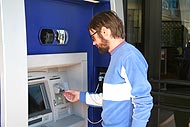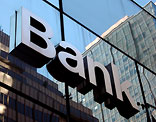Banking
Types of Accounts
Savings accounts and checking accounts (sometimes called instant-access accounts) are the two main types of bank accounts.
A checking account is the most common type of bank account. Most checking accounts do not cost anything to open and maintain, especially if you sign up for direct deposit, the automatic deposit of paychecks into your account.
A checking account is the most common type of bank account. Most checking accounts do not cost anything to open and maintain, especially if you sign up for direct deposit, the automatic deposit of paychecks into your account.
Bank Services and Fee
 Bank fees can add up quickly. Here are some of the most common bank fees.
Bank fees can add up quickly. Here are some of the most common bank fees.ATMs and Personal Checks
Most checking accounts come with a cash card for ATMs (automated teller machines) and a supply of personal checks. Personal checks are free to write, but you will probably have to pay for a supply of checks.
Most banks, where you have an account, let you withdraw cash from their own ATMs for free. You must pay a fee to use ATMs from other banks, usually a minimum of $1.50 per transaction. You will need a PIN (personal identification number) to use your ATM card.
Overdrafts
Beware of overdrawing your account (withdrawing or writing checks for more money than you have in your account). Most banks will not alert you when your balance falls to zero. Instead, they will charge you $30 or more for each overdraft.
Money Orders
Banks charge a fee, usually $5 and up, to issue a money order or certified check. Banks in the U.S. do not issue money orders or certified checks in foreign currency.
Money orders are also issued at USPS locations.
Online Banking
Most banks offer free online services, such as checking your balance and transaction history. Many charge a monthly fee, however, to pay bills, transfer money, or do other tasks online.
Choosing a Bank
Consider the following when selecting a U.S. bank:
- Does your home bank have a partnership agreement with the U.S. bank? This can make it easier to open an account once you have arrived in the U.S.
- Does the U.S. bank require you to have a Social Security number or ITIN number?
- Is the account completely free? If not, what will you be charged for and when?
- How large is the bank's ATM network? Does the bank charge for ATM transactions?
- How many locations does the bank have? Is there a branch near where you live and work?
- Does the bank have good (or bad) customer service? Are there always long lines at the branch you would most likely use?
The following are some of the major banking institutions found within the Los Angeles area:
| Bank of America | California Bank and Trust |
| Citibank | Union Bank of California |
| Chase Bank | Wells fargo |
Opening a Bank Account
You must visit the bank in person to establish a bank account in the U.S. Before visiting the bank, please contact the bank of your choice, make an appointment and find out what documents you need. In most cases, you will need two forms of identification, one of which must be a passport. The second identification could be: a foreign driver's license, a foreign identification card, a California ID card or a U.S. driver's license. Sometimes a credit or debit card from your home country may be accepted.
Each bank has different rules governing the documents needed to open an account. You may need to supply evidence of a permanent address (such as a utility bill), a recent I-94, or even your Getty invitation/grant letter. In addition, you may want to ask if the bank accepts an ITIN (Individual Tax Identification Number) or if a Social Security Card is needed.
Each bank has different rules governing the documents needed to open an account. You may need to supply evidence of a permanent address (such as a utility bill), a recent I-94, or even your Getty invitation/grant letter. In addition, you may want to ask if the bank accepts an ITIN (Individual Tax Identification Number) or if a Social Security Card is needed.
Transferring Money from Abroad
Transferring money from a foreign bank to a U.S. bank can take time. You will need to provide your home bank with the name, address, and phone number of the U.S. bank, the account number and account holder's name at the U.S. bank, the international routing number of the U.S. bank (commonly known as the ABA number within the U.S. and the Swift Identifier Code or Telex number outside the U.S.), and the amount to transfer.

